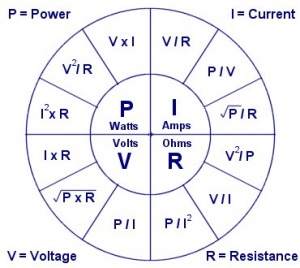Ohm's Law: Difference between revisions
| Line 23: | Line 23: | ||
***The voltage of a typical [http://en.wikipedia.org/wiki/Nickel%E2%80%93metal_hydride_battery NiMh AA battery] is 1.25 volts DC (VDC). | ***The voltage of a typical [http://en.wikipedia.org/wiki/Nickel%E2%80%93metal_hydride_battery NiMh AA battery] is 1.25 volts DC (VDC). | ||
***Many Integrated Circuits require 5 volts DC (VDC) to power them. | ***Many Integrated Circuits require 5 volts DC (VDC) to power them. | ||
===Formulas=== | |||
{{sqrt|2}} | |||
<math>\sqrt{\pi}</math> | |||
==Current '''(I)'''== | ==Current '''(I)'''== | ||
Revision as of 05:28, 28 October 2012
Disclaimers
The standard disclaimers pertaining to the information contained on this wiki page are listed here.
THIS PAGE IS UNDER CONSTRUCTION AND IS NOT COMPLETE AND HAS NOT BEEN CHECKED FOR ERRORS YET!!
Ohm's Law
Ohm's Law is a formula that relates the basic electrical properties of Voltage, Current and Resistance. These properties can be measured with a multimeter.
The common formula for Ohm's Law is:
- V=IR
- Voltage = Current x Resistance
- V=IR
Ohm's Law Diagram
The following diagram shows the relationship between the various electrical properties.

Voltage (V)
Voltage is measured in volts (V). Voltage is a measure of the electric potential difference between two points.
There are two basic type of voltage:
- AC Alternating Current
- Example:
- The voltage of a typical wall power outlet in the United States is 120 volts AC (VAC).
- Example:
- DC Direct Current
- Example:
- The voltage of a typical NiMh AA battery is 1.25 volts DC (VDC).
- Many Integrated Circuits require 5 volts DC (VDC) to power them.
- Example:
Formulas
<math>\sqrt{\pi}</math>
Current (I)
Current is measured in amps (A). Current is a measure of the flow of electric charge. Current is often measured in milliamps (ma) in many electronic circuits. A milliamp is one thousandth of an amp (0.001A).
- Example:
- A typical LED draws 20 milliamps (0.02A or 20mA).
- A typical string of 100 count incandescent lights draws 0.33A.
Resistance (R)
Resistance is measured in ohms (Ω). Resistance is a measure of the opposition to the passage of an electric current through a circuit component. Resistors are the most common form of resistance in circuits.
- Example:
- A common current limiting resistor for driving optoisolators is 680 ohms (Ω).
Power (P)
Power is measured in watts (W). Power is a measure of the rate of doing work.
The common formula for Power is:
- P=VI
- Power=Voltage x Current
- P=VI
- Example:
- A common table lamp is 100 watts (100w).
LED Calculator
Use these calculators to calculate the resistor needed to include in a circuit with a LED.
Single LED
LED Calculator for 1 LED.
Array of LEDs
LED Calculator for an array of LEDs.